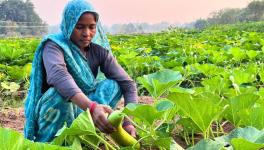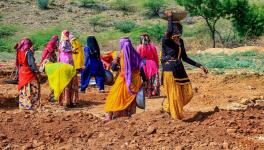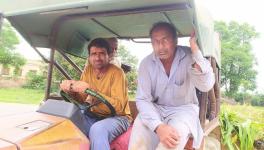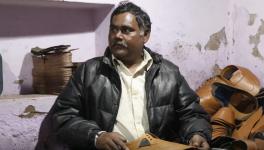COVID-19 in Rural India – X: Livelihoods at Risk in Uttar Pradesh’s Mahuvatar
Image use for Representational only. image Courtesy: The Hindu
This is the tenth report in a series that provides glimpses into the impact of COVID-19-related policies on life in rural India. The series, commissioned by the Society for Social and Economic Research, comprises reports by various scholars who have been conducting village studies in different parts of India. The reports have been prepared on the basis of telephonic interviews with key informants in their study villages. This report assesses the ground situation in Mahuvatar, Uttar Pradesh, where starvation is a reality for the landless and small landowning families. The livestock economy in the area is in the doldrums while food insecurity haunts those in need. The Centre’s cash transfer benefits have not reached the village either, which stares at more worry after the harvest season ends.
The village of Mahuvatar is situated on the banks of the Ghaghra river in Uttar Pradesh’s Ballia district. The major caste groups in the village are Yadavs, Dhobis, Rajbhars, Gonds and Kurmis but the Yadavs dominate the area, constituting between 70% to 80% of the population. They are the socially and economically dominant caste in the village and own most of the land. Landowning families engage in cultivation and animal husbandry here. Besides the Yadavs, households from other castes are either landless or own small plots of land. They engage in agricultural work, construction work and their traditional caste occupations. Poor households rear goats to supplement their regular income.
Impact on agriculture
Wheat, mustard, peas and pulses (chickpeas, pigeon peas, latari, masur) are the major rabi crops in the village. No restrictions have been imposed on the movement of farmers and labourers in the fields during the lockdown. As a result, farmers have not had to face a shortage of labour for harvesting their rabi crops. Agricultural labourers in the village are predominantly from the Rajbhar caste and workers from the Chamar caste from the adjoining village of Mathiya.
In the last week of March, farmers were preparing to sow sugarcane in their fields. However, due to the lockdown, they were unable to purchase fertilisers and protective chemicals that were needed at the time of sowing and had to go without them. This is likely to have a significant impact on sugarcane yields in the coming year.
Some farmers, particularly from the Kurmi caste, grow vegetables and sell them to traders in the local market. These farmers have also been unable to purchase fertilizers and protective chemicals needed to prevent pest infestation or a disease from affecting their crops.
Due to the lockdown, the local vegetable market has been closed and supply links to the nearby town are broken. As a result, vegetable growers are not able to sell their produce.
Impact on livestock economy
Nearly all the shops that sell livestock feed such as oil-cake and bran are shut due to the lockdown. A few shops that have stocks of livestock feed are selling it at a premium of 10% to 20% over pre-lockdown prices. Farmers sell milk to local milkmen who in-turn supply it to sweet shops, tea shops and urban households of the Belthara Road town. A dominant share of the demand for milk comes from sweet and tea shops. Since these shops are shut due to the lockdown, there has been a drastic fall in the demand for milk; milkmen are now only procuring and supplying milk to households in Belthara Road. As a result, farmers are unable to sell their milk and are having to distribute it among villagers for free. There has been no change in the price of milk in the town or in the prices that the milkmen pay to dairy farmers.
The cattle trade, which was already suffering because of the rise in cow vigilantism ever since the Bharatiya Janata Party came to power, has stopped completely after the lockdown began. Cattle traders cannot travel from village to village to buy cattle that farmers might want to sell. The cattle markets, where farmers and cattle traders would gather to buy and sell cattle, are also shut due to the lockdown.
While peasants in the village own cattle, poor, landless households rear goats and poultry. These households have suffered major losses due to rumours that did the rounds in February that COVID-19 spreads through meat. This fear caused a drastic fall in the demand for chicken and goat meat. The price of chicken, which is usually close to Rs 160 per kg, plummeted to Rs 20 per kg. A farmer from the village who rears goats said that the Holi season used to be the best season for sales. This year, however, hardly any goats were sold.
Impact on employment and food security
All non-farm activities have come to a grinding halt after the lockdown was announced. Construction workers, who continued to work in neighbouring villages during the initial days of the lockdown, were harassed and beaten up by the police. Those in caste-based traditional occupations, such as washermen, barbers and blacksmiths are the only ones in non-farm work who continue to work during the lockdown.
However, the move has increased the risk of starvation for the landless and small landowning households. The harvest season has brought work for some, but members of landless and small landowning households have largely been unable to find any work. Due to the absence of any government intervention at the village level to address the issue of food security, many of these households are struggling to fulfil their food requirements.
During the initial phase of the lockdown (March 24 to March 27), all shops and establishments except hospitals and banks were ordered to stay shut. Even shops that sold essential goods and food items were shut. Prices of most essential commodities went up during this period because there was a shortage and these items had to be bought clandestinely, without attracting the attention of the police. The prices of most food items and essential commodities that are not produced locally rose. The price of green chillis went up from Rs 80 per kg to Rs 500 per kg; the price of tomatoes jumped from Rs 40 per kg to Rs 80 per kg while the price of sugar doubled to Rs 80 per kg.
Although many news reports mentioned corruption in the allocation of licenses, the prices of essential commodities came down after March 27 when the government introduced a system of licenses allowing shops selling essential commodities to stay open. For instance, a shop in the adjoining village, Mathiya, has been given a license to sell essential goods to the people of Mathiya and neighbouring villages like Mahuvatar at controlled prices.
The MGNREGA scheme has been dysfunctional for the last six or seven years. Workers’ job cards have not been updated and new job cards have not been created for many years. A worker who had a job card six or seven years ago and had found work under MGNREGA scheme reported that the cash transfer to MGNREGA workers announced by the government is availed by well-to-do people who are close to the village head—poor labourers are not benefiting from the cash transfer scheme.
The state government had also announced that a sum of Rs 1000 would be transferred to the accounts of construction workers registered with the labour department, cart owners, small shop owners and rickshaw pullers. However, none of the construction labourers in this village are registered with the labour department and, consequently, none of them have received any kind of cash transfer. Small owners and cart owners have not received any cash transfers either.
The lockdown, which was declared without any accompanying government policies to address the issue of food security and loss of income, has put a great deal of stress on the landless and small landowning households. Most of the relief measures announced by the government later are yet to have any impact on the inhabitants of this village. The first week of the lockdown was the most difficult, as no work was available during this period. Households had to sustain themselves by buying food items on credit, or receive them as gifts and alms. The onset of the harvest season has brought some relief. However, the demand for agricultural labour is not enough to provide work to everybody. And, once the harvest season ends, these households will face the prospect of starvation once again.
Umesh Yadav is a researcher at Tri-continental Institute for Social Research.
Get the latest reports & analysis with people's perspective on Protests, movements & deep analytical videos, discussions of the current affairs in your Telegram app. Subscribe to NewsClick's Telegram channel & get Real-Time updates on stories, as they get published on our website.
























